Illegal Animals Seized in U.S. Mail
Posted on Mar 27, 2014 in MainNR14-03
March 27, 2014
HONOLULU — The state Attorney General’s Office and the Hawaii Department of Agriculture (HDOA) executed a search warrant today at a Manoa residence that involved illegal animals sent through the U.S. Mail. One person has been arrested. Questions regarding the arrest and any charges should be directed to the Attorney General’s Office.
The illegal animals included four poison dart frogs that were contained in a shipment through the U.S. Mail and about 20 additional frogs that were seized at the residence. Several aquarium tanks were confiscated and its contents inventoried by Plant Quarantine inspectors. While there are limited established populations of species of poison dart frogs on Oahu and Maui, the frogs are illegal to possess or transport to or within Hawaii. The incident is still under investigation and no further details are being released at this time.
All live animals imported to Hawaii require a valid import permit from HDOA. This includes live insects; birds; mammals; rodents; reptiles and amphibians; fish, crustaceans and aquatic animals and microorganisms. There are many restricted and prohibited animals that may not be imported due to potential harm to Hawaii’s environment and agriculture. Information on importing animals is available on HDOA’s website at: https://hdoa.hawaii.gov/pi/pq/import-program/
The maximum penalty for possession and transport of illegal animals is a class C felony, $200,000 fine and up to three years in prison. Anyone who knows of illegal animals or those who smuggle them into the state are encouraged to call the state’s PEST HOTLINE at
643-PEST (7378).
The State’s Amnesty Program allows illegal animals to be turned in and provides immunity from prosecution. Illegal animals may be turned in to any HDOA Office, Honolulu Zoo, Panaewa Zoo in Hilo or any Humane Society – no questions asked and no fines assessed.
Poison dart frogs are native to Central America and South America. In their native range, their skin produces a toxin that has been used by indigenous people to poison the tips of arrows to kill prey. The frogs’ toxicity is derived from the type of ants they eat in their native range.
Due to the different diet in Hawaii, the frogs in Hawaii are not considered as toxic. The species found in Hawaii is Denobratus auratus – bright green and black in color. The frogs seized were of several other species.
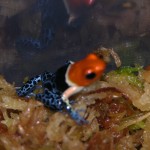 |
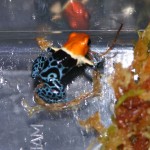 |
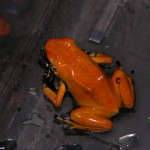 |
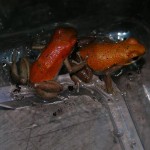 |
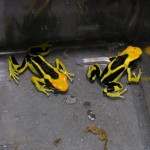 |
Media Contact:
Anne Lopez, Special Assistant to the Attorney General
Department of the Attorney General
(808) 586-1284
[email protected]
Janelle Saneishi, Public Information Officer
Department of Agriculture
(808) 973-9560
[email protected]
https://hdoa.hawaii.gov
